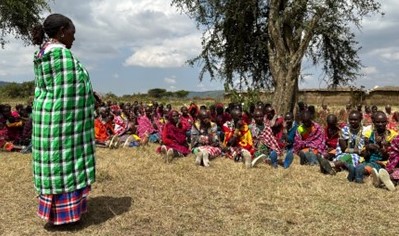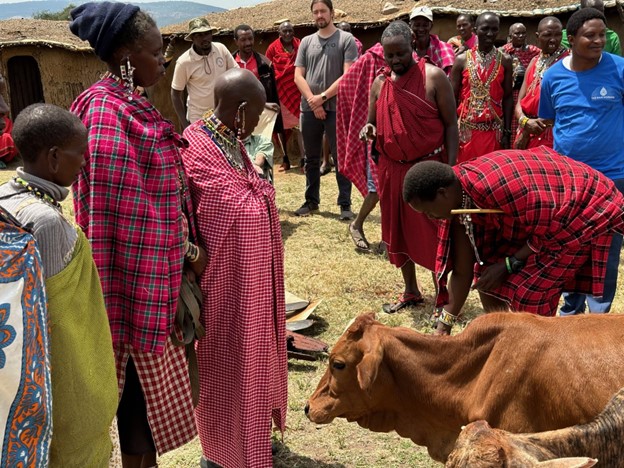How two partners strive to help a community in Tanzania

By Scott Hollblad-Fadiman
It’s 2024. Nations are struggling and conflicts are raging on a daily basis; so commonly that most of us have become numb. From the war in Gaza to the Ukrainian war, to smaller conflicts burning throughout the world, our news brings us stories from those fighting oppression and poverty every day. However, though most readers know the rough structure of major geopolitical conflicts, few readers are shown the stories of smaller, equally important struggles, and even fewer readers in the West know grassroots, day-to-day stories of victory and loss that flow from Africa. Let me tell you a story of loss and struggle–small on the global scale, but burning bright in the minds and hearts of the Maasai people and many others who stand united, shoulder to shoulder against injustice and tyranny… The story of the eviction of the Maasai people in Tanzania from lands where their ancestors’ ancestors have lived.
The worst eviction to date happened in 2022, when the Tanzanian government evicted thousands of Maasai from the Ololosokwan area using military force. Over 2000 Maasai fled their villages to safety, with many fleeing to Kenya for refuge. More than 36 local Maasai leaders and other defenders of human rights were detained indefinitely in Arusha for their involvement in the Maasai protests against eviction. More than 466 Maasai livestock animals were “detained” by the government upon eviction of their owners and sold behind closed doors for a profit.
Many Maasai communities have become critically impoverished as a result of the loss of grazing land and livestock theft. Already, almost 7-8 kilometers of land has been unjustly stolen from the Maasai by the government, with more being cleared and claimed daily. An injustice for many yet unheard of on western news channels and largely unknown to the world.
I was fortunate enough to meet with, and interview one man who chose to fight against injustice for his people’s future. Mr. Paul Ole Leitura, CEO of Mulika Africa, decided to make a difference by helping both the aforementioned displaced Maasai community at large and more specifically the individual members of his own village and many others. The 6th of 7 children in a Maasai family, Leitura grew up very poor, with education being a distant dream. However, he was able to attend primary and secondary school through the support of his entire village. Upon graduating from secondary school, in an attempt to give back to the community in response to his village’s support, Ole Leitura volunteered for several NGOs, ending up working for Oxfam as a food monitor, which involved traveling between villages on a bicycle to provide food to villagers in need.

Paul opted to study for his bachelor’s degree in Uganda, receiving a BA in social work and administration. After graduating, he got a job in a Tanzanian hospital as an administrator, a demanding job which forced him to confront the needs of the wider public on a daily basis, forcing him to expand his viewpoint and driving him to think yet again about how to give back to the community that built him.
Paul then shifted away from administration into community outreach, with a specific focus on teaching about fistulas, vaginal health, and personal hygiene. Though even more demanding of a job than being a hospital administrator, Paul found it a worthy and fulfilling job, for how else can one grow apart from conquering the challenges of life?
In 2002, a single personal connection changed Paul. While traveling through Singida, he found a woman who had been living with a fistula for almost 28 years. The guilt of seeing her endure that condition ate him alive; tears were shed, decisions were made and a path forward emerged. He thought of his conscience and responsibility for his people. All of his years of experience helping those in need crystallized, and Paul snapped. He found the lady, took her to a hospital and got her treated within the day.
That one woman, that one single connection he made galvanized Paul into really laying down the groundwork for his future organization, and he began to figure out what he wanted to help with, whom he could work with, and how he could acquire partners. After some success and failure, the dream took form. Mulika Africa was formed in 2017, registered in 2021, and now has started formalizing operations in communities in Longido, Monduli, Ngoro Ngoro, and Simanjiro across Tanzania. Having studied for his master’s degree in project management and planning, followed by a degree in law degree, Paul’s goal is to help financially, as well as through awareness of the issues of the people or through linking them to services which may help them.
There is another important man who plays a critical role in this story of loss and new beginnings. Another man with the same ethos and drive to help others, an equally inspiring man named Dr. Jony Rust.
This story has a humble beginning, with Paul meeting Dr. Rust while Rust was an intern in a local Lutheran hospital learning how to repair a fistula. Paul was working at the same hospital as an outreach coordinator and fistula project administrator and was assigned to help with the orientation and introduction for both Dr. Jony and his mentor upon arrival. He traveled with Dr. Rust to local villages and around the community, acting as a local liaison of sorts and laying the groundwork for a deep friendship. The bonds between them, forged through professional experiences, paved the way for years of future friendship.
Mr. Rust went back to England after his medical internship but kept in contact with Paul for many months. When he came back in 2014, he came to work with the same hospital where he had interned and settled down to stay in Tanzania. Upon reconnecting, the two men discussed Paul’s earlier desire to help his community, which led to Jony accepting an offer to join Paul as a member of the Mulika Africa board. Working on the basis of mutual trust, they began to visit Longido villages together, interviewed community members and began to get a picture of the needs of the people, which included schooling issues, community food, the issues of the women in the community, and provision of goats and cows. In the process, Mulika Africa grew between the two of them into the organization it is today.
Both Mr. Rust and Mr. Ole Leitura are currently working hard to help their communities on a personal level. But how exactly do they translate the vague notion of “help” into actual action?
Currently, there are two major displacements that the Maasai are facing: first, the Maasai people living in Ngoro Ngoro conservation area—a protected wildlife area—are being forcibly relocated to the Tanga region of Tanzania. Second, segments of Loliondo have been sold to Arabic buyers for hunting purposes, forcing the relocation of the local Maasai people there as well. The displacements have had a heavy toll on the people, causing a wide range of issues in terms of sanitation, education, logistics, and hygiene.
While Paul and Jony cannot interfere in government or state affairs, Mulika Africa is able to help address this systemic impoverishment in local communities by focusing on individual health and health practices, to allow communities to thrive and begin to rebuild. Programs like Mulika Africa’s Teenage Sanitation program are key. It is unheard of for Maasai fathers or mothers to give their teenage girls any sanitary products at all to last them through the school day. This lack of education and widespread misinformation directly raise teen pregnancy rates, decrease attendance, and are a major obstacle that teen girls must overcome to pursue secondary schooling. Mulika Africa has been supplying young ladies in several schools in Loliondo and Longido with sanitary pads and sanitary training to address this issue. Much improvement has been seen already, with girls maintaining good attendance in school as a result of the availability of sanitary pads and better personal hygiene practices.
A second issue revolving around Maasai girls is the traditional resistance to allowing young girls to attend school. To combat this discrepancy while respecting local traditions, Mr. Ole Leitura travels to meet elders separately from their families, sharing his ideas about further education for the young women of families with them, while aiming to come up with a collective grassroots approach that is acceptable to all involved. The village elders and elderly women work together directly with Paul to come up with a community-oriented, sustainable approach which the locals then implement themselves. Whatever Paul does, he shares with every person in the communities he works with, from elders all the way down to the youngest children—by the people, for the people.

A third program that Mulika Africa is running is a community health program where people from local Maasai communities are trained in basic medicine and hygiene practices by Mulika Africa and pass that knowledge on to their communities on the grassroots level. They are trained to deal with sexual reproductive health, and how to educate youth and adolescents on the systemic issue of early forced marriages. Education and schooling are emphasized, as well as healthy sexual practices. Community health workers educate primary school students about female genital mutilation, and also educate the communities to stop circumcision, and emphasize equality of educational access between girls and boys.
They both offer resources and help, but also raise awareness, encourage women to attend clinics before delivery and after delivery so doctors can ensure proper care and early identification of medical challenges, and to encourage members of the community to regularly visit the hospital to get screened for HIV, and other STDs.
Once you have a healthy community, they can work hard and produce. Mulika Africa’s holistic focus on health, entrepreneurship, skill development promotion, giving the displaced Maasai cows and goats as a way of empowering them and allowing them to produce milk, positively impacts the population.
The displaced Maasai remain a pastoralist people with a culture that emphasizes the economic value of livestock. Paul interviews local leaders using the same grassroots approach emphasized in the previous programs outlined above, works with the community to learn who lost cows to the government and who needs cows, and funds the acquisition and donation of cows to those the community elects as most in need through donations.

Through the generosity of several donors, Mulika Africa has so far provided cows and other livestock, running water, modern sanitation, and innovative garden towers to many Maasai communities. Furthermore, a new program named “Manyatta 1895: Maasai men helping Maasai women develop Tanzania” is being implemented to allow certain Maasai villages to convert themselves to “cultural areas,” and allow them to demonstrate to tourists aspects of their culture, lifestyle, and history, using donations to thrive and grow further.
These two men, their team, and this organization stand shoulder to shoulder with their Maasai brothers while helping to rebuild the life that was torn away from them by the government. Cow by cow, they rebuild their stolen wealth. Yield by yield, their new fields become a true home. Dream by dream, the Maasai begin to thrive again, and little boys and little girls born under the care of community health experts, and raised with good hygiene practices, are both given a chance to dream to go to school… as equals.

